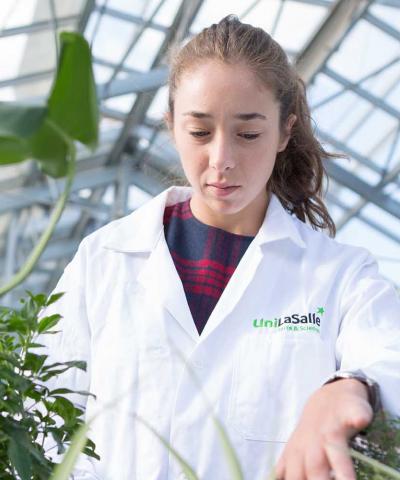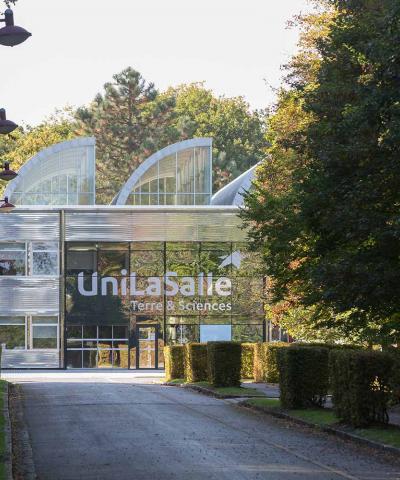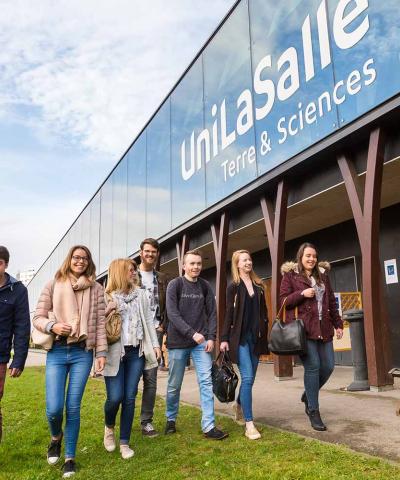The sustainability of natural resources - soil, water and biodiversity - associated with agricultural production.
The challenges of natural resource management in agroecosystems
This course is in line with current issues related to the integrated protection of natural resources and the development of ecosystem services in agroecosystems. It focuses at different spatial scales on :
- the control of processes and interactions within agroecosystems governing the sustainability of natural resources from the rhizosphere to the watershed scale;
- The study of the effects of different management practices on natural resources and the application of these practices by aiming at the multifunctionality of agroecosystems;
- The characterization and spatialization of ecosystem services provided by agroecosystems by applying numerical and economic tools.
Details of the courses
Semester 7 - Agroecology: Processes at different scales
Agroecology major: Processes at different scales
The objective of this major is to master the processes and interactions within agroecosystems governing the sustainability of natural resources (soils, water and biodiversity) from the rhizosphere to the watershed scale.
Minors
Each semester includes two blocks dedicated to minors, corresponding to 54 hours of complementary courses that allow students to complete their training in a related field.
Several minors are offered on the Rouen campus, some of which require travel to the campus (the others can be taken by distance learning).
Some examples of minors
Block 1: Agroecological pest management / Forestry and forest management: Knowledge of forest environments, typology of sites and history of silviculture / Sustainable weed management / Global Environmental Issues / Identification of Geo, Bio Energies (Geo-bio energies label) / Water Resources, Polluted Sites and Soils...
Block 2 : Digital Mapping / Conducting an Environmental Authorization Application / Water and Nutrient Management / Mindful, Nature Inspired and Regenerative Entrepreneurship - Exploring Concepts / Economic Models / Digital Transition / Alternative and Connected Agricultures...
Semester 8 - Management of natural ressources
Management of natural resources major
The objectives of this major are to study the effects of different management practices on natural resources and to apply these practices with a view to the multifunctionality of agroecosystems.
Minors
Each semester includes two blocks dedicated to minors, corresponding to 54 hours of complementary courses that allow students to complete their training in a related field.
Several minors are offered on the Rouen or Rennes campus, some of which require travel to the campus (the others can be taken by distance learning).
Some examples of minors
Block 1: Bioindicators for soils / Advanced spatial analysis / Risk management in agriculture / Energy sustainability in farms / Crop protection, product innovations and genetic levers...
Block 2: Conservation and/or organic farming / Field diagnosis in the spring / Circular carbon economy: energy mix, PCAET and local wood industries / Entomology (pests and crop auxiliaries) / Innovation, Carbon neutrality and Territories (Geo-bioenergies label) / Cropping systems for transitions...
Semester 9 - "A la carte" major
In semester 9, you can choose your pathway according to your desires, by choosing among :
- the main major of the Natural Resource Management in Agroecosystems course, which goes into this field in greater depth: Multidisciplinary Evaluation of Ecosystem Services (Beauvais campus)
- one or more opening majors, designed to broaden your skills in another field:
- Agriculture and Society (Beauvais campus)
- Territory projects: Coordination and animation (Beauvais campus)
- Sustainable Agri-Food systems in the word (Rouen campus)
- Intrapreneurship, entrepreneurship and innovation (Beauvais campus)
- a semester, a double degree or a degree-granting stay in France or abroad (from 12 to 18 months for a double degree or a degree-granting stay)
Sesmester 10 - End of Study Internship
The end-of-studies project is based on an internship in a company or a research internship for students, or on the long period in a company for students following an apprenticeship program.
It leads to the writing of a thesis and an oral presentation.
What careers are there after the Natural Resource Management in Agroecosystems course?
The Natural Resource Management in Agroecosystems program allows students to work in resource management, agri-environment, agricultural consulting, and research.
Some jobs
- Agronomy/environmental studies officer
- Project engineer in runoff and soil erosion management
- Agro-resource consultant
- Design engineer in methanization
They can also pursue research by obtaining a doctorate.
They welcome our engineers
CHAMBER OF AGRICULTURE OF OISE, LIOSE - ENVIRONMENTAL ENGINEERING CONSULTANCY, INRAE - NATIONAL RESEARCH INSTITUTE FOR AGRICULTURE, FOOD AND THE ENVIRONMENT, BIOTOPE - ECOLOGY AND LAND USE CONSULTANCY, APAD - ASSOCIATION FOR THE PROMOTION OF SUSTAINABLE AGRICULTURE



